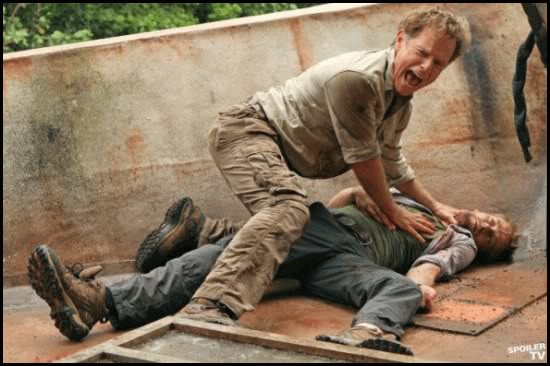ABC’s The River played out its initial season true to the form of the Constant Jeopardy Syndrome. The very end of the eighth episode (last of the initial production order) has the crew of the Magus, along with the recovered Dr. Emmet Cole, believing they are heading home. [SPOILER ALERT] But the Boiuna River isn’t going to let them go. It changes the landscape around them, cutting them off from access to the main channels of the Amazon. They may have found Emmet, but the River is not letting them get away.
Of itself, that ending continues to feed into the restrictions of the Constant Jeopardy Syndrome. But the last couple of episodes also add another factor to the mix, which has a (pardon the pun) deadening effect on the over-all drama. Apparently, in the territory of the Boiuna, being killed does not necessarily mean you are dead.
No Exit Through Death
We had seen this in varying degrees all along, of course. But with this finale episode, the non-death death gets pounded home with force.
Lincoln gets shot and killed. There is no doubt about the death. He is dead.

In typical mother-fashion, however, Tess tries to find a way around it. She convinces Jahel to perform a ritual to raise the dead — and it apparently works.
 Emmet, however, having spent the last six months skirting the edges of death (he may even have crossed the border, but we don’t know for sure), realizes that the reanimated Lincoln is actually possessed by a hostile spirit. Lincoln’s own spirit may be present, but they have to get rid of the invader to be sure.
Emmet, however, having spent the last six months skirting the edges of death (he may even have crossed the border, but we don’t know for sure), realizes that the reanimated Lincoln is actually possessed by a hostile spirit. Lincoln’s own spirit may be present, but they have to get rid of the invader to be sure.
They succeed in that, using father-son emotional bonds to bring it about. Lincoln is back, alive, himself.
And then they find they’re still stuck on the River.
Over the course of the eight episodes, the storytellers have played with aspects of death. But because the intention was to create an ongoing series with a limited cast of characters, they have created a situation that plays against the key archetype of the series, Death.
Death Has Meaning
When we look at Death, two things affect us — there is the deep sense of loss we endure; but there is also the sense that it is a part of a never-ending cycle. Archetypically, then, Death signifies massive change. Even if there is a resurrection in a story, our expectation is that there will be a drastic change because of it.
That is part of the horrible power of zombie stories, of course. We see the reanimated bodies of people we knew, but they are drastically changed. Usually because the personalities we knew and loved are gone.
In other stories of people who “go through death,” the characters come through the experience transformed. Perhaps their natures are purged of flaws, perhaps they gain extra powers from “the other side,” perhaps their attitudes are simply altered. But the point is that Death is the symbol of change.
In the stories of The River, however, we don’t see that. Death apparently doesn’t change anything. The spirit of the dead missionary child in the (really spooky) second episode just wants her mother back. No change. Lena’s father just wants to tell her again that he loves her. No change.
 The return of Jonas is a bit more complicated, though. Yet even so, in the last episode we discover that his character has not really changed in spite of experiencing death. And most importantly, once the resurrected Lincoln is freed of the hostile possessing spirit, we find … he’s pretty much just the same as he always was.
The return of Jonas is a bit more complicated, though. Yet even so, in the last episode we discover that his character has not really changed in spite of experiencing death. And most importantly, once the resurrected Lincoln is freed of the hostile possessing spirit, we find … he’s pretty much just the same as he always was.
If the storytellers for The River are not going to allow change in the characters, they end up undercutting the power of using Death to “scare” us. If death really isn’t an option, if “everyone comes back” and does so without changing because of the experience, the accumulative effect on the audience flattens out because nothing is at stake. There will be neither loss nor gain for these characters as they go through death after death. It would be difficult to sustain emotional credibility, because though we watch them revert back to a status quo, we don’t believe the experience could mean so little to the characters.
Killing the Impact of Death
Death is a very tricky archetype to play with. If you take away its power to transform people and circumstances, seriously transform them, you make it insignificant. And the problem is, the audience cannot believe that. For the audience, Death is the ultimate event. It must have significance. It cannot be treated as a plot tool to heighten emotional engagement for this moment. You cannot say, “Let’s kill the main character this week. The audience loves him. They’ll be shook up and so happy when we bring him back to life.” Well, okay, yes, you can say that. Once. And it will have to have an ongoing impact on the characters.
Unfortunately, for these eight episodes, The River wasn’t doing a very good job in giving us the transformations that should go with Death.
When Death is not really an option, you destroy your most powerful agent of change.

Isn’t a major theme of the River the loss of the power to change? One can not change one’s location. One can not change one’s situation as alive or dead. And even the great existential/spiritual experience of dying can not change one.
In other words, isn’t the intent of this to convey the horror of lossing one’s most powerful agent of change, i.e. death?
I’m not sure the storytellers of the show had a sense of major theme. I think they wanted to do a scary show, and thought “What if they were trapped in this magical place and couldn’t get out?” They didn’t consider the problems that are inherent when you have a limited cast — you can’t kill anyone off, so how does it stay scary? The premise structure works against the intention to be scary.
That said, your last observation is interesting to me. Mainly because in a fantasy novel I’m working on, I have a race of people who are “immortal in this world” (well, not our world, but the one they live in). My intention is similar to Tolkien’s with his elves – a consideration of immortality. In my case, I made it possible for these characters to suffer the death of the body, but then become refleshed. Not re-incarnation as in being born again, though. And yet, I’ve intended them to be capable of change. So on the one hand, although I agree that death is a great motivator for change, I don’t think its absence precludes the ability to change. That was what disappointed me about The River – the traumatic events didn’t seem to substantially affect the characters. It did not ring true psychologically.
It sounds as though death remains a rite of passage to this people about whom you will be writing, however.
I think you’re correct about the storytellers, but that only makes me consider the loss of change even in death as a missed opportunity for them.
For my work, yes it is a rite of passage. In fact they have a ritual to acknowledge this change. And in fact, once the death of the original body has been suffered, there are consequences in the refleshed body. 🙂
As for The River, yes, losing the reality of actual death was a hindrence in the storytelling. That goes back to my analysis of the Constant Jeopardy Syndrome and the Incidental Jeopardy pattern. For the audience, the hook is that this time (in this immediate story) there’s a 50/50 chance that the main characters could fail, even to the ultimate of death. But this show established that for these people that was not going to happen. But they didn’t have a mechanism to introduce new characters because the established characters were all personally tied to the premise of recovering Bruce Greenwood’s character. Any new character became automatically expendible. But unfortunately, the audience isn’t invested in incidental (ie, here for this story only) characters.